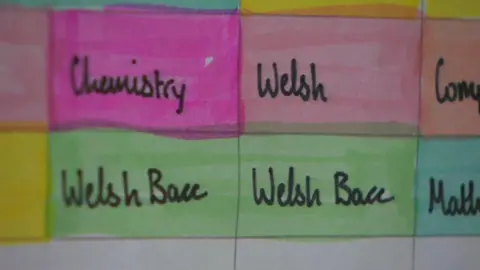Estyn: Welsh Baccalaureate teaching is too varied
 BBC
BBCThere is too much variation in how schools teach the Welsh Baccalaureate and in the enthusiasm and expertise of teachers delivering it, say inspectors.
But education body Estyn says schools have adapted well to new GCSEs in English, Welsh and maths.
It comes in its report on reformed qualifications introduced in 2015.
Estyn also says there has been a narrowing of the curriculum with fewer options for pupils because of the focus on core subjects.
This latest report follows another only a few months ago from the Welsh exams watchdog which said the Welsh Bacc was "too complex" and that a number of pupils, teachers and parents struggled to understand it.

What is the Welsh Bacc?
- The Bacc brings together a number of qualifications but at its heart is the Skills Challenge Certificate (SCC)
- Versions can be studied by 14 to 16 year olds and since 2015 it has been graded
- To achieve the SCC students must complete an individual project (which counts for 50%) and three other challenges - testing enterprise and employability skills, knowledge of global issues and participating in community-based activities
- More than 23,443 students took the qualification at key stage four last summer
- In 2017, 67.6% successfully gained a grade C or above in the SCC.

The education inspection body also reports a "narrowing of the curriculum" in many schools.
Estyn says although nearly all schools include a focus on literature as part of English and Welsh language lessons, the proportion of pupils following GCSE English or Welsh literature and other subjects has "declined considerably" since 2012.
This has already led to one leading Welsh writer and poet to call for literature to be reinstated as a core subject.
There has also been a decline in entries for non-core subjects like history, geography, and design and technology, and a steep drop in French GCSE entries over the last five years.
What does this Estyn report say about the Welsh Bacc?
- In most schools, staff are chosen to deliver the Welsh Bacc mainly on their timetable availability
- There is too much variation in the enthusiasm and expertise among teachers delivering the course
- The quality of leadership is also too variable
- A majority of pupils are broadly positive about the Bacc qualification, although a minority are negative
- But only a minority of learners would take the Welsh Bacc out of choice
- There has not been enough planning to extend more able pupils
- Only a minority of Welsh Bacc teachers have access to networks of good practice with other colleges or schools
- Very few pupils (5.3%) achieve A* and A grades in their Skills Challenge Certificate, compared with English and maths GCSEs
- It wants an improvement in boys' performance

David Evans, secretary of teaching union NEU Cymru, said the Welsh Bacc had been beset with problems ever since it was first introduced and that the Welsh Government would do well to look at the report's findings.
He said it "tells us that there remains some way to go before the Welsh Bacc is fully embraced in our schools, by students, future employers and some universities".
GCSEs in Wales were reformed after a review highlighted concerns about literacy and numeracy, and recommended changes to the structure and content of the qualifications.
Changes included introducing two maths GCSEs - mathematics and numeracy.
The review found that in most cases pupils are "very positive" about their English, Welsh and maths lessons.
In English and Welsh, it said pupils show strong oracy skills but writing skills are less well developed.
The Welsh Government welcomed the report and said it was pleased it had found results have so far remained steady when compared with previous years.
"We will continue to work with education consortia and schools to make sure that all learners are supported in developing their ICT and numeracy skills in Welsh Baccalaureate lessons and ensure that our expectations for the qualification are clear," said a spokesman.
